修饰可数名词和不可数名词的单词
- 格式:doc
- 大小:33.50 KB
- 文档页数:7
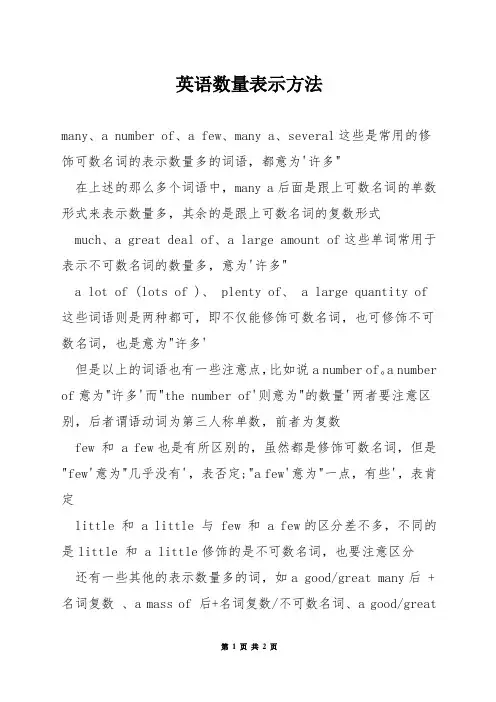
英语数量表示方法many、a number of、a few、many a、several这些是常用的修饰可数名词的表示数量多的词语,都意为'许多"在上述的那么多个词语中,many a后面是跟上可数名词的单数形式来表示数量多,其余的是跟上可数名词的复数形式much、a great deal of、a large amount of这些单词常用于表示不可数名词的数量多,意为'许多"a lot of (lots of )、 plenty of、 a large quantity of这些词语则是两种都可,即不仅能修饰可数名词,也可修饰不可数名词,也是意为"许多'但是以上的词语也有一些注意点,比如说a number of。
a number of意为"许多'而"the number of'则意为"的数量'两者要注意区别,后者谓语动词为第三人称单数,前者为复数few 和 a few也是有所区别的,虽然都是修饰可数名词,但是"few'意为"几乎没有',表否定;"a few'意为"一点,有些',表肯定little 和 a little 与 few 和 a few的区分差不多,不同的是little 和 a little修饰的是不可数名词,也要注意区分还有一些其他的表示数量多的词,如a good/great many后 +名词复数、a mass of 后+名词复数/不可数名词、a good/greatdeal of后+不可数、a supply of后+ 名词复数/不可数名词。
4英语数量表达(1)用来询问事物的数量,后接不可数名词。
例如:How much milk is there in the glass?玻璃杯里有多少牛奶?(2)用来询问事物的重量。
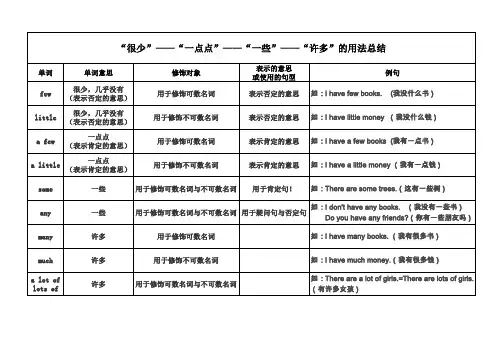
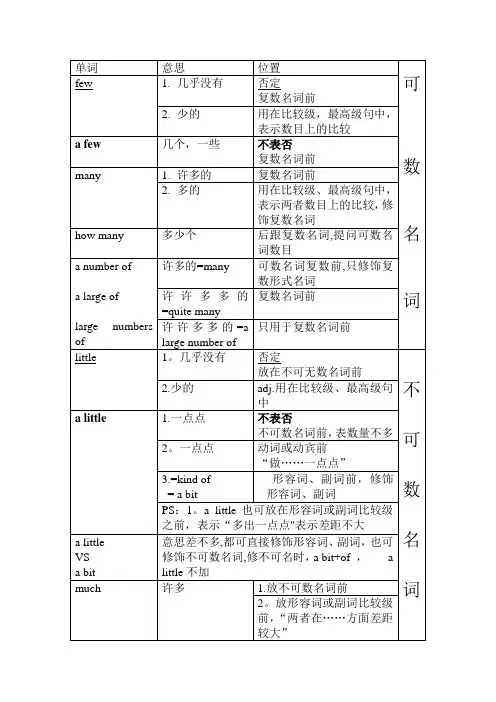
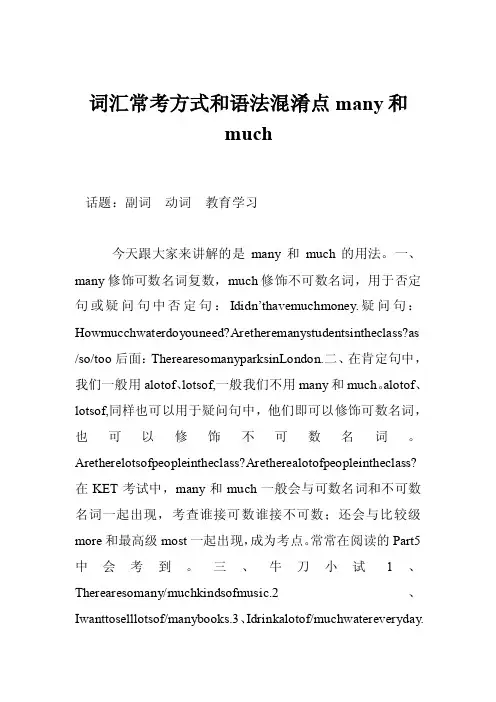
词汇常考方式和语法混淆点many和much话题:副词动词教育学习今天跟大家来讲解的是many和much的用法。
一、many修饰可数名词复数,much修饰不可数名词,用于否定句或疑问句中否定句:Ididn’thavemuchmoney.疑问句:Howmucchwaterdoyouneed?Aretheremanystudentsintheclass?as /so/too后面:TherearesomanyparksinLondon.二、在肯定句中,我们一般用alotof、lotsof,一般我们不用many和much。
alotof、lotsof,同样也可以用于疑问句中,他们即可以修饰可数名词,也可以修饰不可数名词。
Aretherelotsofpeopleintheclass?Aretherealotofpeopleintheclass?在KET考试中,many和much一般会与可数名词和不可数名词一起出现,考查谁接可数谁接不可数;还会与比较级more和最高级most一起出现,成为考点。
常常在阅读的Part5中会考到。
三、牛刀小试1、Therearesomany/muchkindsofmusic.2、Iwanttoselllotsof/manybooks.3、Idrinkalotof/muchwatereveryday.本周讲解的就是在KET考试中,大家最容易混淆的like、wouldlike的用法一、like表示某人喜欢某事或者某物,或者喜欢做的事情(这种情况下like后面通常+动词ing形式)比如:Ilikeyournewclothes.Haveyouhadthemlong?Ilikegoingtothecine ma,butIdon’tlikefantasyfilmsverymuch.二、wouldlike是KET 的高频考点,但是很多孩子不明白wouldlike到底是个什么意思。
在这里阮晶老师可以告诉大家,如果你见到了wouldlike,那么在某些情况下就可以跟want互换,只不过want表达的语气更加强烈一些而已。

考向11 不定代词 a few, a little, few, little1)a few, a little, few, littlefew和a few经常用来修饰或者代替可数名词;a little和little经常用来修饰或者代替不可数名词。
a few和a little的意思是“有一点、有几个”,表示肯定意义;few和little的意思是“很少、几乎没有”,表示否定的意义。
2)one,it,that,thoseone可以泛指任何人和事物,可以用在形容词和指示代词this和that的后面代替上文提到的可数名词,即“同名异物”,其复数形式是onesit是指上文提到的或者下文将要提到的人、事物和情况。
即“同名同物”that特指的是同一类,并非同一个,其复数形式是those3)all,both,either,neither,noneall表示三者或三者以上都如何,否定词是none,意为“没有一个”。
both是表示两者之间的人或者事物都如何。
它的否定词是neither。
either表示“两者中的任何一个”,作主语时谓语动词用单数。
neither表示“两者都不”,作主语时谓语动词用单数。
none表示否定,可以指人或物,常接of短语。
4)the other(s),other(s) ,anotherother 泛指其他的,修饰复数名词。
others 泛指其他的人或物。
the other 指“两者中的另一个”。
the others 特指其余的所有人或物。
another 指“三者或以上中的另一个”。
5)复合不定代词,something, anything, nothing等something意为“某些事物”,主要用于肯定句;有时也用于疑问句中表示请求。
anything意为“任何事物”,主要用在否定句和疑问句中。
nothing意为“没有任何事物”,是表示否定意义的不定代词。
(2022·四川泸州·统考中考真题)Hurry up, Su Mei! The graduation ceremony begins in a second. We have ________ time left.A.few B.a few C.little D.a little【答案】C【详解】句意:快点,苏梅!毕业典礼马上就要开始了。
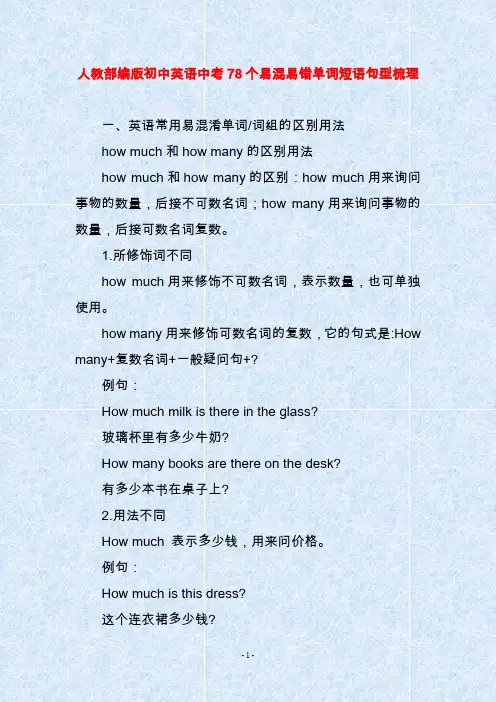
人教部编版初中英语中考78个易混易错单词短语句型梳理一、英语常用易混淆单词/词组的区别用法how much和how many的区别用法how much和how many的区别:how much用来询问事物的数量,后接不可数名词;how many用来询问事物的数量,后接可数名词复数。
1.所修饰词不同how much用来修饰不可数名词,表示数量,也可单独使用。
how many用来修饰可数名词的复数,它的句式是:How many+复数名词+一般疑问句+?例句:How much milk is there in the glass?玻璃杯里有多少牛奶?How many books are there on the desk?有多少本书在桌子上?2.用法不同How much 表示多少钱,用来问价格。
例句:How much is this dress?这个连衣裙多少钱?How many 表示多少,用来问数量。
例句:How many apples do you have?你有多少苹果?in和on的区别用法当我们表示某些东西被其他东西所包围时使用“in”这个词。
而“on”用于描述物体被放置在其他物体上方或外部的情况。
in可表时间,表地点,表手段、方法、材料。
on表示时间、地点、方位等。
1.意思不同in:prep.在 ... 里;在 ... 地方;在 ... 期间on:prep.在 ... 之上2.用法不同in:in着重一段时间的过程,常用于重复动作或延续动作。
in表示从现在时间算起推移到将来的一段时间之后,一般与将来时态连用。
例句:He is a layman in economics.他对经济学一窍不通。
on:表示“在物体的表面上”,只能用on的表达方式有on the next morning,on the following。
例句:The spider is walking on the ceiling.蜘蛛在天花板上爬行。
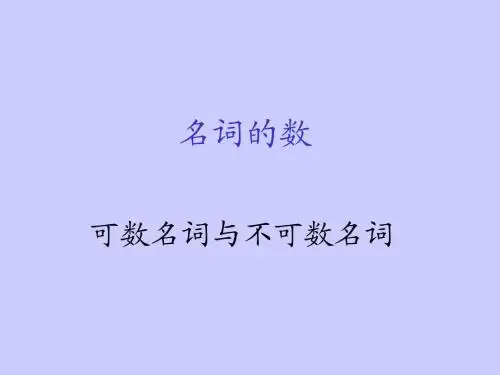
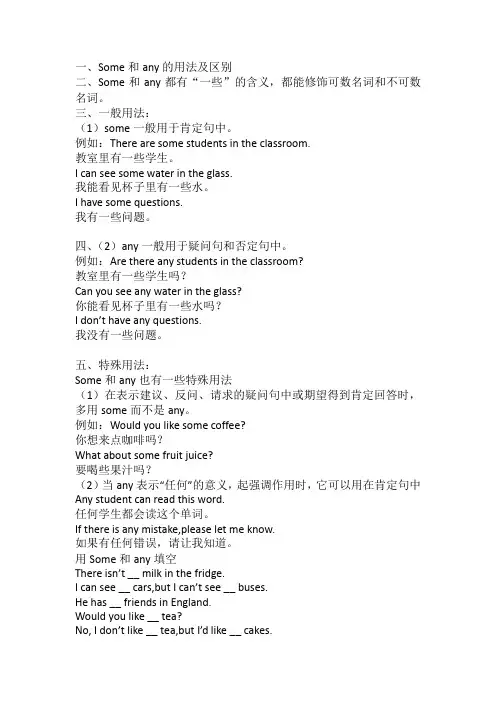
一、Some和any的用法及区别二、Some和any都有“一些”的含义,都能修饰可数名词和不可数名词。
三、一般用法:(1)some一般用于肯定句中。
例如:There are some students in the classroom.教室里有一些学生。
I can see some water in the glass.我能看见杯子里有一些水。
I have some questions.我有一些问题。
四、(2)any一般用于疑问句和否定句中。
例如:Are there any students in the classroom?教室里有一些学生吗?Can you see any water in the glass?你能看见杯子里有一些水吗?I don’t have any questions.我没有一些问题。
五、特殊用法:Some和any也有一些特殊用法(1)在表示建议、反问、请求的疑问句中或期望得到肯定回答时,多用some而不是any。
例如:Would you like some coffee?你想来点咖啡吗?What about some fruit juice?要喝些果汁吗?(2)当any表示“任何”的意义,起强调作用时,它可以用在肯定句中Any student can read this word.任何学生都会读这个单词。
If there is any mistake,please let me know.如果有任何错误,请让我知道。
用Some和any填空There isn’t __ milk in the fridge.I can see __ cars,but I can’t see __ buses.He has __ friends in England.Would you like __ tea?No, I don’t like __ tea,but I’d like __ cakes.There aren’t __ trees behind the house. What about __ coffee?True mastery of any skill take a lifetime.对任何技能的掌握都需要一生的刻苦操练。
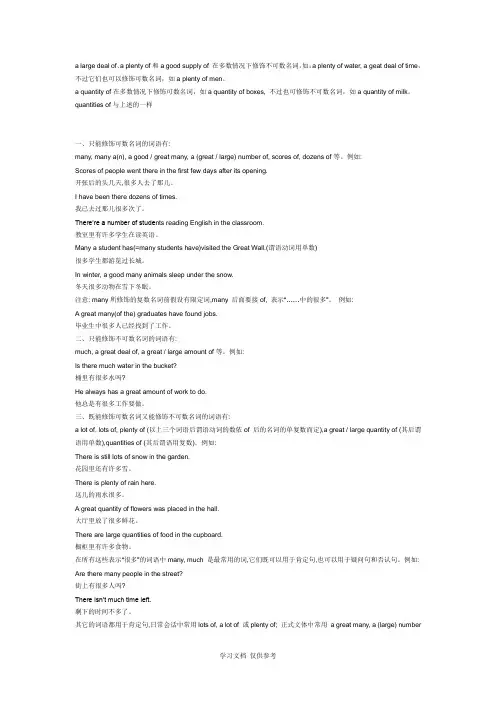
a large deal of、a plenty of和a good supply of 在多数情况下修饰不可数名词,如:a plenty of water, a geat deal of time,不过它们也可以修饰可数名词,如a plenty of men。
a quantity of在多数情况下修饰可数名词,如a quantity of boxes, 不过也可修饰不可数名词,如a quantity of milk。
quantities of与上述的一样一、只能修饰可数名词的词语有:many, many a(n), a good / great many, a (great / large) number of, scores of, dozens of等。
例如:Scores of people went there in the first few days after its opening.开张后的头几天,很多人去了那儿。
I have been there dozens of times.我已去过那儿很多次了。
There’re a number of stude nts reading English in the classroom.教室里有许多学生在读英语。
Many a student has(=many students have)visited the Great Wall.(谓语动词用单数)很多学生都游览过长城。
In winter, a good many animals sleep under the snow.冬天很多动物在雪下冬眠。
注意: many所修饰的复数名词前假设有限定词,many 后面要接of, 表示“……中的很多”。
例如:A great many(of the) graduates have found jobs.毕业生中很多人已经找到了工作。
二、只能修饰不可数名词的词语有:much, a great deal of, a great / large amount of等。
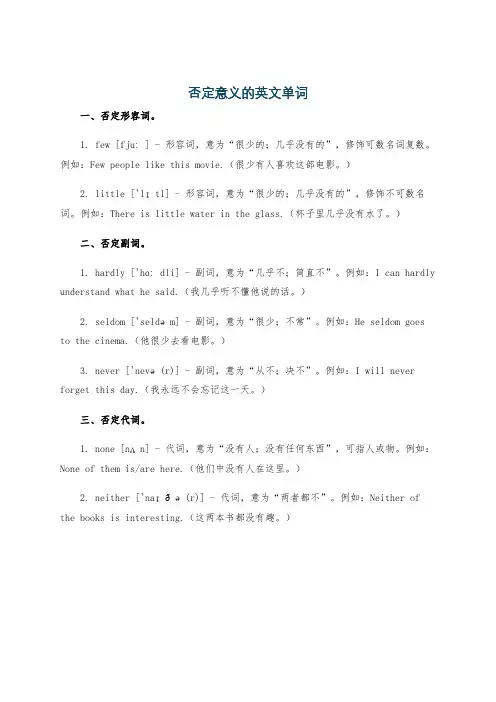
否定意义的英文单词
一、否定形容词。
1. few [fjuː] - 形容词,意为“很少的;几乎没有的”,修饰可数名词复数。
例如:Few people like this movie.(很少有人喜欢这部电影。
)
2. little ['lɪtl] - 形容词,意为“很少的;几乎没有的”,修饰不可数名词。
例如:There is little water in the glass.(杯子里几乎没有水了。
)
二、否定副词。
1. hardly ['hɑːdli] - 副词,意为“几乎不;简直不”。
例如:I can hardly understand what he said.(我几乎听不懂他说的话。
)
2. seldom ['seldəm] - 副词,意为“很少;不常”。
例如:He seldom goes to the cinema.(他很少去看电影。
)
3. never ['nevə(r)] - 副词,意为“从不;决不”。
例如:I will never forget this day.(我永远不会忘记这一天。
)
三、否定代词。
1. none [nʌn] - 代词,意为“没有人;没有任何东西”,可指人或物。
例如:None of them is/are here.(他们中没有人在这里。
)
2. neither ['naɪðə(r)] - 代词,意为“两者都不”。
例如:Neither of the books is interesting.(这两本书都没有趣。
)。

much和any的用法一、用法概述在英语中,much和any是两个常用的单词,它们有着不同的用法和含义。
本文将详细介绍这两个单词在不同语境下的用法,并为读者提供使用示例。
二、much的用法及示例1. much作为形容词时,意为“大量的”或“许多”,常用于修饰可数名词或不可数名词。
- There is so much homework to do tonight.(今晚要做很多作业。
)- He has eaten too much cake.(他吃了太多蛋糕。
)2. much也可作为副词使用,表示程度深或程度高。
- I appreciate your help very much.(我非常感激你的帮助。
)- The weather is too cold, and I don't feel much like going outside.(天气太冷了,我不想去外面了。
)3. 在疑问句和否定句中,much可以与动词连用,询问或表达情感强烈的否定。
- Do you like this movie? No, not really that much.(你喜欢这部电影吗?没有那么喜欢。
)- How much do you know about the subject?(你对这门学科了解多少?)4. 多数情况下,much和too连用,表示“太多”或“过于”。
此时,too much通常修饰不可数名词,而too many则修饰可数名词的复数形式。
- The soup has too much salt.(这汤盐太多。
)- There are too many people in the room.(房间里有太多人。
)三、any的用法及示例1. any作为形容词时,表示没有限制或选择的数量,并常与否定词连用。
- We don't have any milk left.(我们没有剩下任何牛奶。
)- I can't find my keys anywhere.(我无论哪里也找不到我的钥匙。
英文中的不可数名词与可数名词1.不可数名词Some nouns in English are uncountable nouns.英语中有些单词是不可数名词。
We do not use uncountable nouns in the plural and we do not use them with the indefinite article, a/an.不可数名词没有复数形式,我们也不用不定冠词a/an修饰他们。
We ate a lot of foods > We ate a lot of foodWe bought some new furnitures > We bought some new furniture.That’s a useful information > That’s useful informationWe can use some quantifiers with uncountable nouns:我们可以用某些量词修饰不可数名词:He gave me some useful advice.They gave us a lot of information.Uncountable nouns often refer to:不可数名词有一下类别:Substances: food; water; wine; salt; bread; ironHuman feelings or qualities: anger; cruelty; happiness; honesty; pride; Activities: help; sleep; travel; workAbstract ideas: beauty; death; fun; lifeCommon uncountable nouns常见的不可数名词There are some common nouns in English, like accommodation, which are uncountable nouns even though they have plurals in other languages:英语中有许多名词,如accommodation,是不可数名词,但它在其他语言中有复数形式:2.可数名词Count nouns have two forms: singular and plural.可数名词有两种形式:单数和复数。
初中英语冠词语法的定义与用法一、冠词的分类1. 不定冠词:a/an 修饰可数名词单数2. 定冠词:the 修饰可数名词或不可数名词3. 零冠词:/ 修饰可数名词或不可数名词二、不定冠词的用法(表示泛指)1. 音素掌门:判断一个单词或字母前加a还是an首先需要判断它发音的第一个音素→若为元音音素,如a:, ei, 则用an →an unusual day; an hour; an honest man,an American an egg,→若为辅音音素,如p, h, 则用a →a usual day; a European countrya one-eyed man; a broken egg2. a/an 大法:U 型大法,是指 U 有两个音,发/ju:/时用 a,发/?/时用 an。
a UFO a uniform(制服); a usual manan unusual man; an umbrella(雨伞)an ugly UFO; a university(大学)an ugly dog; a useful book:欧洲两怪,是指元音字母开头,但是发辅音。
a one-year-old boy; a Europeana one-eyed man; a European country:隔山打牛。
”山”是指开头不发音字母 han honest boy ;an hour;a heavy box:吸星大法。
字母单独出现时的用法。
【第一个音素是辅音的字母】 a “C” in the word “CAT”【第一个音素是元音的字母】下面字母单独出现时只能用 anan NBA player; an “f”in the word “friend”总结:(father 和 mother 能送来杏仁+a e i o)f h m n s l x r a e I o3.固定短语:1. It was getting late. She went back home ___B___.A. in hurryB. in a hurryC. in the hurryD. in hurriesdo sth. in a hurry 匆忙地做某事2. I am in trouble. Could you give me ___A___.A. a handB. handsC. two handsD. handgive sb. a hand帮助某人*可数名词以其中一个代表一类时(强调整体):A bird can fly。
道正编高考英语重点单词归纳41. achieve指经过努力而获得动力或达到某种目的gain 指经过努力而奋斗而,获得某种利益,如处世经验get 常用词,指以某种方法或手段得到某种东西,这东西可能是他需要或企图获得的,也许不是。
across prep. & adv.穿过,由这边到另一边;横过cross v. 穿过; 横过act v.. 做;行动v.演出;扮演角色n.行为;动作,举动action n. 行动acto r n.男演员actress n. 女演员act as 充当;担任act...out 比划着表演active adj. 积极的;主动的,活跃的take an active part in 积极参加be active in热心于actual adj.真实的,实际的actually adv. in fact 实际上;事实上2. real, true 与actual的区别:real 真的,真正的,指客观上存在,并非想象和虚拟,与“无”相对,反义词为unrealtrue 真实的,强调事实的实际情况相符,与“假”相对,反义词为falseactual 真的,强调事实上已经发生或存在,而不是理论上可发生或存在3. AD公元;纪元BC公元前ad = advertisement n. 广告add v.增加;添加;补充说add...to.. 往…加…add up to 加起来总共是4. address n.住址n. 演讲v. 对…发表演讲;称呼admire v.羡慕admire 后接名词或动名词;不接that引导的从句admiration n. 赞美;羡慕admirer n. 羡慕者;钦佩者(男)admiringly adv. 钦佩地admit v. 1).许可;允许…进入2).承认;供认advance v. & n. 1). 前进;向前2). 提出n. 1. 前进2.进展、进步advanced adj. 先进的advantage n. 优势;便利adventure n. 历险;奇遇adventurer n. 冒险家advice n. 忠告;劝告; 意见advise v. 劝告persuade v. 说服aeroplane n. = plane飞机5. affair n.事件;事情foreign affairs 国事务love affairs 桃色事件accident 指不幸的意外事故,如:车祸;摔伤,多指无意或偶然的。
冠词英语词汇表冠词英语词汇表A1. a: 一个(不定冠词,用于单数可数名词前)2. an: 一个(不定冠词,用于以元音音素开头的单数可数名词前)3. the: 定冠词(用于特指的人或事物,或特指一类人或事物)B1. both: 两者都(指两个人或物)2. neither: 两者都不(用于否定两个人或物)3. either: 两者中任一个(指两个中的一个)4. each: 每个(强调个体的不同)C1. some: 一些(泛指不确定数量或特指的一部分)2. any: 任何一(用于否定句或疑问句中,表示不限制数量)D1. this: 这个(用于近处的人或事物)2. that: 那个(用于远处的人或事物)3. these: 这些(用于近处的人或事物的复数)4. those: 那些(用于远处的人或事物的复数)E1. every: 每个(强调全体的重要性)2. either...or: 两者之一(表示二选一)3. neither...nor: 既不...也不...(表示两个都不是)F1. few: 少数(修饰可数名词的复数形式,表示数量很少)2. a few: 几个(修饰可数名词的复数形式,表示数量较少)3. little: 少量(修饰不可数名词,表示数量很少)4. a little: 一些(修饰不可数名词,表示数量不多)G1. many: 许多(修饰可数名词的复数形式,表示数量较多)2. much: 许多(修饰不可数名词,表示数量较多)H1. one: 一个(用于指代某个人或事物)2. two: 两个(用于指代两个人或事物)I1. other: 另一个(用于指代其他人或事物)2. some other: 另一些(用于指代其他人或事物的复数)3. another: 另一个(用于指代“又一个”)J1. any other: 另外的(用于指代其他的事物)2. no other: 没有其他的(用于指代没有其他的事物)K1. one more: 再一个(用于指代又一个,强调数量增加)L1. one of: ...之一(用于描述从范围内选出的一个人或事物)2. the only: 唯一的(用于强调只有一个人或事物)M1. all: 所有的(强调全体成员)2. half: 一半的(表示数量为一半)N1. one another: 互相(用于指代两个或更多人或事物之间的关系)2. each other: 相互(用于指代两个人或事物之间的关系)O1. plenty of: 许多(表示数量很多)P1. such: 这样的(修饰可数或不可数名词,强调独特性)Q1. several: 几个(用于修饰可数名词的复数形式,表示数量几个)R1. what: 什么(用于疑问句)2. which: 哪个(用于疑问句)3. whose: 谁的(用于疑问句,表示所有关系)S1. another: 另一个(用于指代“又一个”)T1. all the: 所有的(用于指代全体成员)2. some other: 另一些(用于指代其他人或事物的复数)U1. once: 一次(用于表示发生的次数)以上是冠词的英语词汇表,希望对您的英语学习有所帮助。
既可以作可数名词又可以作不可数名词的单词具体是可数还是不可数要在具体语言环境中体现,你可以只记一方面,记住可数的,其他方面大多为不可数了.在牛津词典的标注中,一种含义的注释前面都有[C,U],所以,此题不能完全绝对的回答1.interest作名词既可做可数名词也可以做不可数名词interest作为“兴趣”讲时用作不可数名词,但可以加不定冠词.interest作“爱好;引起兴趣的地方”讲时为可数名词.interest 作“利害(关系);权益;股份”讲时,为可数名词2.glass——玻璃——玻璃杯paper——纸——报纸、文件tin——锡——罐头copper ——铜——铜币iron——铁——熨斗youth——青春——青年人beauty——美——美人necessity——必要性——必需品3.salad,ice cream, cabbage,onion, wine一颗白菜,一份沙拉,一盒冰激凌,一颗洋葱,这就可数.当作吃的东西泛指的时候,比如洋葱全都切成丝看不出来几颗的时候,就不可数.说明一下:当一个不可数名词被用於分类的情况时,它可以被当做可数名词. 因此,以wine 为例子, wine 通常是个不可数名词("I'd love wine with dinner."),即使你喝了一杯以上的酒,你仍然是喝wine ,而不是wines . 但当我们在做酒的分类时,这名词就变成了可数的:"There are many fine Canadian wines.". 甚至water这个字在某些情况下也可以变成可数的:"the waters of the Pacific Ocean are noticeably colder this year.". 有时一个名词可以是可数或是不可数,而它们的意思几乎完全相同:Chilean wine is superb. Chilean wine is superb.Chilean wines are superb. Chilean wines are superb.一般来说,个体名词和集体名词是可以计数的,所以称之为可数名词,有单、复数形式.例如:a city(一个城市)——two cities(两个城市),a bird(一只鸟)——five birds(五只鸟).其中复数的形式变化就不说了,你应该知道.有规则的变化形式,也有不规则的,不规则的需要你自己平时多记.物质名词和抽象名词一般是不可计数的,所以称之为不可数名词,它们通常只有单数形式.但在具体情况下也可以用作可数名词.snow(雪)snows(积雪)water(水)waters(海/湖水)cloth(布)clothes(衣服)paper(纸)papers(报纸/文件/试卷)time(时间)times(时代/次数/倍)custom(习惯)customs(海关)Fish 可数与不可数的问题1. 鱼肉因为是物质名次,不可数I will have fish for dinner.2.表示鱼的数量,单复数同形There are some fish in the river.3. 表示鱼的总类可数,因为是个体名词Many fishes are in the sea.。
alotof的用法和含义一、alotof的用法和含义在英语中,我们常常会遇到一些词语的拼写形式与实际含义不符合逻辑的情况。
"alotof"就是其中之一。
虽然很多人犯了这个错误,但实际上,在标准英语中,并不存在单词"alotof"。
正确的形式应该是"a lot of"。
"a lot of"是一个短语,通常用作表示数量或程度的副词短语,在口语和书面英语中都非常常见。
它是由三个部分构成的:副词"a"、名词"lot"和介词短语"of"。
下面将详细介绍这三个部分在该短语中所扮演的角色以及其用法。
1. "a"在"a lot of"中, "a" 是一个不定冠词,用来表示泛指或未具体限定的数量。
与其他不定冠词类似,它没有复数形式。
2. "lot"在"a lot of"中,“lot” 是一个可数名词或不可数名词前面可以修饰数量或程度的指示性副词。
例如:- We have a lot of books.(我们有很多书)- She has a lot of experience in that field.(她在那个领域有丰富经验)需要注意的是,“lot”在这里只能以单数形式出现。
如果我们想表示更多的数量,可以使用"lots of"来表示复数形式。
3. "of"最后,在"a lot of"中,“of” 是一个介词,用于连接名词与其他成分。
它的作用是定义或描述一个名词和该名词所修饰内容之间的关系。
在此短语中,“of” 用来引导后面描述、补充或具体化“lot”的内容。
例如:- I have a lot of friends from different countries.(我有很多来自不同国家的朋友)- He ate a lot of food at the party.(他在聚会上吃了很多食物)二、使用"a lot of"的注意事项使用"a lot of"时,有一些需要注意的重要细节,确保正确地运用该短语。
a large deal of、a plenty of和a good supply of 在多数情况下修饰不可数名词,如:a plenty of water, a geat deal of time,不过它们也可以修饰可数名词,如a plenty of men。
a quantity of在多数情况下修饰可数名词,如a quantity of boxes, 不过也可修饰不可数名词,如a quantity of milk。
quantities of与上述的一样一、只能修饰可数名词的词语有:many, many a(n), a good / great many, a (great / large) number of, scores of, dozens of等。
例如: Scores of people went there in the first few days after its opening.开张后的头几天,很多人去了那儿。
I have been there dozens of times.我已去过那儿很多次了。
There’re a number of stude nts reading English in the classroom.教室里有许多学生在读英语。
Many a student has(=many students have)visited the Great Wall.(谓语动词用单数)很多学生都游览过长城。
In winter, a good many animals sleep under the snow.冬天很多动物在雪下冬眠。
注意: many所修饰的复数名词前若有限定词,many 后面要接of, 表示“……中的很多”。
例如:A great many(of the) graduates have found jobs.毕业生中很多人已经找到了工作。
二、只能修饰不可数名词的词语有:much, a great deal of, a great / large amount of等。
例如:Is there much water in the bucket桶里有很多水吗He always has a great amount of work to do.他总是有很多工作要做。
三、既能修饰可数名词又能修饰不可数名词的词语有:a lot of, lots of, plenty of (以上三个词语后谓语动词的数依of 后的名词的单复数而定),a great / large quantity of (其后谓语用单数),quantities of (其后谓语用复数)。
例如:There is still lots of snow in the garden.花园里还有许多雪。
There is plenty of rain here.这儿的雨水很多。
A great quantity of flowers was placed in the hall.大厅里放了很多鲜花。
There are large quantities of food in the cupboard.橱柜里有许多食物。
在所有这些表示“很多”的词语中many, much 是最常用的词,它们既可以用于肯定句,也可以用于疑问句和否定句。
例如:Are there many people in the street街上有很多人吗There isn’t much time left.剩下的时间不多了。
其它的词语都用于肯定句,日常会话中常用lots of, a lot of 或plenty of; 正式文体中常用 a great many, a (large) number of, a great deal of, scores of 或 dozens of 等。
但若肯定句中有too, so, as, very或how 等词修饰时,则必须使用 many, much。
例如:The number of the people who lost their homes reached as many as 250,000.无家可归的人数多达250,000人。
There is too much work to do.要做的工作太多了。
一般every,each后用单数;all 后面的名词是复数.)名词性从句及不定式、动名词作主语时,谓语动词一般用单数形式。
【例如】To finish the work in advance is what he wants.Smoking cigarettes is dangerous to your healthWhat seems easy in theory is difficult in practice.What caused the accident is a complete mystery.但是,what引导名词从句作主语时,其表语是复数形式时,系动词也可以是复数形式。
【例如】What we badly need here are qualified teachers.2)当主语是单数,后面跟着由including, with, together with, along with, like, in addition to, as well as, rather than, but, except, more than, accompanied by 等连接的短语时,谓语动词用单数。
【例如】Mary as well as her sister likes listening to music.Doctor Richards, together with his wife and three children, is to arrive on the afternoon flight.My best friend rather than anyone else has got the first prize in the speech contest.3) one, one of, every, everyone, everybody, each, many a, either, neither, no one, nobody, anyone, anybody, someone, somebody用作主语或修饰主语时,谓语动词用单数形式。
【例如】Each man, woman and child has the same right.Many a student doesn’t like to do their homework.(many a student=many students)Either of students is going to compete for the president of the students’ than one person was involved in the case.Neither of the young men who had applied for a position in the university ____. A) has been acceptedB) have been acceptedC) was acceptedD) were acceptedneither用作主语或修饰主语时,谓语动词用单数形式。
此外,定语从句用过去完成时,主句应用一般过去时,故答案为C。
4) and所连接的两个单数名词作主语,指同一人、同一件事或同一概念时,其谓语动词用单数。
例如:My best friendand adviser has changed his mind again.Bread, butter and eggs is typical American Breakfast .If law andsgroupsis not preserved, neither the citizen nor his property is safe.如果不能维持治安,公民和他的财产都不安全。
5)表示时间、距离、重量、体积、金钱的复数名词,作主语时作为整体来看待,谓语动词通常用单数。
【例如】Five thousands dollars is quite a large sum of money to me.Fifty miles is too long a distance for one to walk on foot.1)名词性从句及不定式、动名词作主语时,谓语动词一般用单数形式。
【例如】To finish the work in advance is what he wants.Smoking cigarettes is dangerous to your healthWhat seems easy in theory is difficult in practice.What caused the accident is a complete mystery.但是,what引导名词从句作主语时,其表语是复数形式时,系动词也可以是复数形式。
【例如】What we badly need here are qualified teachers.2)当主语是单数,后面跟着由including, with, together with, along with, like, in addition to, as well as, rather than, but, except, more than, accompanied by等连接的短语时,谓语动词用单数。
【例如】Mary as well as her sister likes listening to music.Doctor Richards, together with his wife and three children, is to arrive on the afternoo n flight.My best friend rather than anyone else has got the first prize in the speech contest.3)one, one of, every, everyone, everybody, each, many a, either, neither, no one, nobod y, anyone, anybody, someone, somebody用作主语或修饰主语时,谓语动词用单数形式。